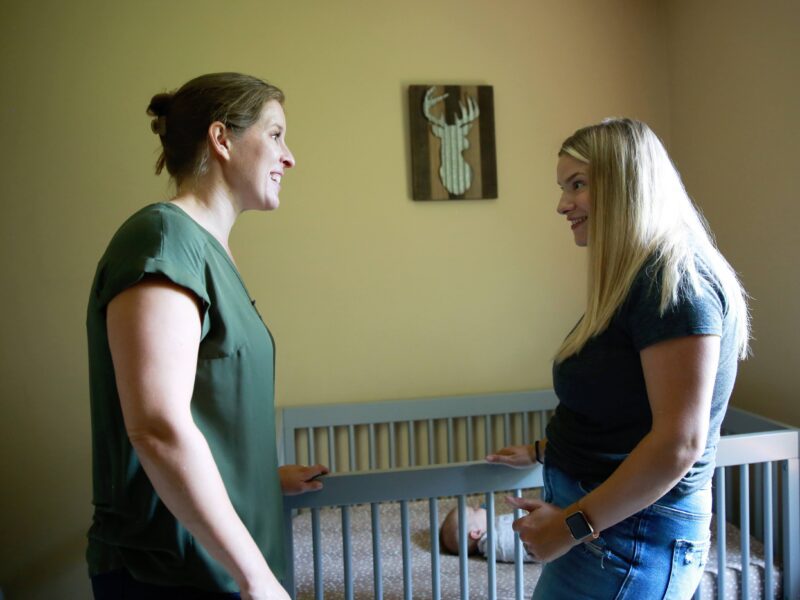As a family therapist, I spent most of my pregnancy trying to prepare my relationship for this transformation we were about to experience. A statistic from my undergrad family psychology class kept circling in my head:
Birth has the same impact on a family system as death.
My husband and I had all the conversations about expectations, roles, fears, and dreams. What I hadn’t factored into this preparation was the reality of the postpartum time period; how things such as difficulty with breastfeeding would leave me feeling on an island by myself, and leave my husband feeling like he couldn’t reach me.
As a new parent, finding your footing in your new role as a mother or father can feel a bit like being thrown into a dance performance where no one has taught you the steps. Your dance partner likely doesn’t know the steps either, which can lead to some mishaps – some that may feel jointly silly and others that leave one or both of you frustrated. The relationship with your partner can shift dramatically during pregnancy and parenthood, impacting such things as communication, trust, and intimacy. Ultimately, these changes in relationships can impact your mental well-being.
There are components of pregnancy and postpartum that create an unequal playing field at the beginning of this new life stage (i.e. only one of you is growing the baby…). What we hear so frequently from folks in therapy and in our personal lives is, “my partner just doesn’t get it”. When people don’t feel seen in their postpartum distress by the person who they expected to be in the trenches of new parenthood with, the distance between these two partners grows.
Mental health does not exist in isolation from our relationships.
We are constantly influencing and influenced by those nearest us. Thus, individual distress is impacting, and impacted by, the increase in relational distress. So how do we break out of this cycle and create opportunities to feel heard within our relationships? One remedy is establishing intentional weekly check-in’s or rituals of connection.
We understand the potential resistance to the thought of adding another task to an already overwhelming schedule (especially with someone who you might not be very fond of at the moment…).
Remember: most of the time, frustration with our significant other comes from a longing for connection and feeling understood.
With that in mind, the goal of these rituals of connection are to feel seen by the other person, thus creating positive change in individual and relational health. Scheduling time to connect is the reality of new parenthood. Otherwise these conversations take place after a night feeding, over a diaper change, or when one or both parties are hangry or overtired – leading to miscommunication, hurt feelings, and further disconnection.
The following are ideas to get you started on establishing a ritual of connection:
“What day of the week? What time? Where?”
If possible, getting out for a coffee date for these check-in’s can be helpful. Emily “jokes” with her husband that they meet in public for their check-in’s so that they are on their best behavior – but there is some truth to that! Wherever the place is, having check-in’s intentionally is already switching up your current cycle of checking-in spontaneously. Imagine carving out an hour a week together for these intentional conversations.
“How can we make this fun?”
Coffee. Donuts. Brunch. Bottle of Champagne. All of the above? Think of something that brings you both joy. The idea is creating a calm atmosphere for these check-in’s, where you feel excited about connecting.
“What are we supposed to check-in about?”
You are checking-in about how the previous week communicating and parenting together went. Start with the good. Appreciate your partner, focus on the positives, and be specific: “I appreciated when you brought me coffee in bed” – instead try, “I appreciated when you brought me coffee in bed earlier this week. I was so tired from my day before and I felt so understood when you surprised me with coffee and let me stay in bed a little longer. Thank you for that”.
Explore what didn’t go so well and brainstorm how to avoid those moments in the coming week. A few important rules to note (from Gottman & Gottman, 2016):
-
No blaming or criticism. No “You” statements. (i.e.: “You never listen to me.”)
-
Talk about your feelings (i.e. “I felt overwhelmed”). Only use “I” statements about a specific situation. (ex: “I don’t feel heard right now.”)
-
Within every complaint there is a longing, and when that longing is expressed a path to fulfill it may arise. By focusing on your feelings, the ability to state a positive, specific need becomes easier (i.e. “I feel like I’m shouldering bedtime alone and need your support to not feel so overwhelmed”).
-
The goal is to express your thoughts and feelings on something that didn’t go so well during the week, and to listen and validate the other person. Once you both feel heard, then it’s time to brainstorm ways to avoid this particular conflict/moment in the following week.
Emily Gibbs is a Licensed Associate Marriage and Family Therapist (LAMFT), a trained Bringing Baby Home educator, and mother. Emily provides both individual and couple therapy that is rooted within a trauma-informed, systems, and attachment-based perspective. Learn more about Emily at Rhythym and Wave Therapy.






No Comments
Sorry, the comment form is closed at this time.